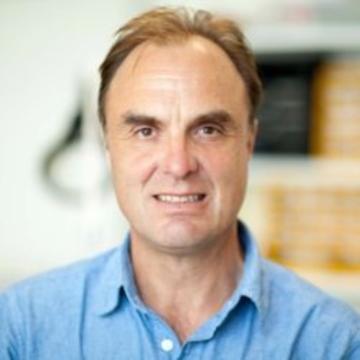Alex Caccia, co-founder and CEO of Animal Dynamics

Alex Caccia is a serial entrepreneur, with start-ups in hardware and software, as well as sports equipment. He is the Co-founder of Animal Dynamics.
This is my 5th business – and by way of background, I wasn’t looking to set up another business when I started on the journey that led to Animal Dynamics. A mutual friend introduced me to Adrian (Prof Adrian Thomas, co-founder of Animal Dynamics), as it turned out we were both interested in understanding the biomechanics of swimming fish, and why they are able to go so fast. We both thought it would be fun to build a human powered machine to travel on water, using fish-like flapping propulsion, and so it began! We spent a very enjoyable year developing our ideas, drawing up CAD designs, and only thought about commercialising when there appeared to be no other option.
Entrepreneurship is about being able to match a vision with the ability to realise that vision. This involves leading a team, investors and customers to believe in something you have imagined, such that they want to be part of delivering that vision.

I never really decided to be an entrepreneur – it’s the other way around: I have had ideas that I want to realise, and products that I would like to make and being an entrepreneur was a way of realising those ideas. When I was younger I did a personality test which showed I had little inclination to work in finance, so decided I would prove it wrong and got a job in finance. Although I didn’t particularly enjoy the work, I did find that I liked business, and so worked with a very successful businessman as an apprentice for a while to help build my skills and confidence. Then I started.
It is incredibly messy and uncertain being an entrepreneur, so you need to be able to be quickly dismissive of ideas that don’t really work (fail fast!), but also have an inexhaustible supply of ideas. You also need to be a communicator, to be able to inspire and motivate your team and investors, and be sufficiently determined to get things done. Lastly, you need to like being a salesman, to your bones!
I love to follow something through from concept to a real sale, knowing that if I hadn’t done it, maybe no one else would have. I also really like the sales process for the same reason. I take great pleasure in not only the achievements, but also the journey.
I am most interested in innovative people or companies, like Elon Musk, James Dyson, or ARM, Jobs of course. ARM is a great UK example of an understated company. They are in every bit of mobile tech, and yet they have done it almost quietly. There are also many not conventionally in business, whom I also think of entrepreneurs, and admire greatly – such as Handel, Fassbinder, Charles and Ray Eames, to name a few.
I would like to find out how they make their decisions, as no one has the time or resource to analyse every decision fully. How they manage to find and work with the best people, who have the right skills to ensure the decisions are the best in the circumstances. I’m always interested in process and method – how organizations and small teams do things.
The journey of coming up with an idea, seeing it through, and having someone pay money for it is so rewarding. It is an amazing and simple thing to have something you created to be valued enough for someone to part with their money, and be happy with the result. But most of all, I like to be part of a team solving problems: the daily banter of moving a project forward.
Hanging onto the wrong people for too long is something many companies do, and this can be unpleasant and undermining for a company. There are great people who just don’t fit into a company or role, and you need to be able to be very careful when it comes to hiring and retaining the right people. Letting people go is very tough.
Oxford is a good place to be able to work with new technologies and spinouts. The support structure here at Begbroke and within the University has been great. Oxford University Innovation has been very supportive, and we are very happy to have the University as a shareholder. On the downside, it is harder to attract and retain talent in Oxford, as London is such a huge draw. Oxford needs to work on infrastructure and logistics to be more competitive – and in particular make more casual work and meeting space available for startups.
Begbroke (Science Park) has been great, but space is at a premium. We snapped up our office before we truly needed it to ensure we had a location! There are also plenty of networking events and groups in Oxford, so just get out there and meet people.
Momentum is really important, but if something is not working, recognise it and change. No amount of brains and effort can fix a bad idea. Focus on what you do best, and make sure you have a good marketing and communications strategy. If you have a great product or service, but no one knows about it, you will not succeed.
Share this
More news



